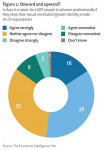Japan’s investment environment is improving despite recent setbacks, says Economist Intelligence Unit
The report is based on in-depth interviews with investors, managers and the authorities both inside and outside Japan. It includes in-depth interviews with representatives from METI (Hiroaki Niihara, director of the corporate affairs division), the Tokyo Stock Exchange (Atsushi Saito, president) and the activist investor community (including Shuhei Abe, founder of Sparx Group). Some of its key findings are as follows:
· Japan has not taken a step back, but nor is it opening rapidly. The rising numbers of “poison pill” takeover defences (now in place at over 500 listed firms in Japan) and growing levels of cross-shareholdings give the impression that Japan has taken a major step back in its attitude towards foreign investment. However, given reforms in the past 10 years to commercial law, regulations and guidelines concerning M&A, the broader picture is more of steady, if slow, progress. Moreover, although investor pressure has historically had a limited effect on management, some shareholders are learning to work within the constraints of Japan’s corporate environment to maximise the value of their investments.
· A perception gap prevents fruitful dialogue between shareholders and managers. Many outside investors view Japanese management as a self-protecting, self-governing group with no external accountability, and with concomitant disregard for the interests of shareholders. Japanese management, for its part, sees activist-type investors as greedy and short-sighted and intent on taking quick profits by making opportunistic demands of management. Recent acrimonious battles have underlined this perception, but the reality is less stark. Managers in Japan do often feel social responsibilities to the company’s other stakeholders, and operate according to these responsibilities, which means shareholder value is often further down the list of managers’ priorities than in other developed economies. However, some investors are beginning to find ways to persuade managers that their interests and those of the shareholders are ultimately aligned.
· An aggressive approach is probably ill-advised. The approach of some activist investors has been inimical to candid discussions with management about raising corporate value. “Once you get into an ‘us-vs-them’ type of struggle, there is no way out,” says one interviewee. “I don’t see room for a no-holds-barred type of investor violence,” says Mr Saito. Funds that have taken a more constructive approach·such as Ichigo Asset Management, Sparx, Carlyle and Atlantic Investment·have made good inroads into improving management performance. Moreover, managers recognise the benefits that external expertise can provide. “[The investors] don’t say things like ‘We are going to educate the management’ publicly,” says Hiroaki Niihara, director of METI’s corporate affairs division, “But in reality they do educate the management in a more subtle manner.”
· Shareholder concerns are being taken more seriously. In some cases foreign activist investors have won battles against management·in May 2008, for example, Steel Partners rallied other shareholders to defeat the proposed reappointment of seven directors of Aderans, a maker of hairpieces. But there is also domestic pressure for reform. Pension-fund managers recognise the need to get higher returns from their investments, and the government is promoting the slogan “From savings to investments” as a means to help solve Japan’s dire fiscal problems. “Taking good care of minority shareholders and Japan’s aging pensioners is very much in keeping with Japan’s values,” says Scott Callon of Ichigo.
· There are signs that corporate governance is improving. Recognising that the likelihood of a hostile takeover is actually quite small, some firms have opted to drop their takeover defences, including Shiseido, a leading producer of cosmetics, and Nissen, a mailorder company. This has been part of a larger debate about the importance of good corporate governance in creating a strong and successful enterprise. In Nissen’s case this includes appointing independent outside directors. Some companies are realising the best protection against being acquired (whether by an activist financial buyer or a strategic rival) is good management and efficient use of shareholders’ money.
· Investors remain at the mercy of major legal gaps. Most market players agree that some problems need instant resolution to reinforce shareholder protection. Companies’ ability to issue shares to third parties is a major problem·allowing poorly performing managers to dilute the holdings of activist shareholders at will. Many believe that short of legislation on the matter, the TSE must issue stricter regulations to counter this, although it seems reluctant to do so.
In conclusion, despite the acrimony of recent battles, most participants see that there is increasing scope for shareholders and managers to work more closely in Japan to raise corporate value. In addition, it is important not to see this as a matter of Japan vs foreign investors; given the country’s fiscal and demographic problems it is crucial for domestic investors to realise greater returns from their assets. Nevertheless, for the time being activist investors will be constrained by the fact that Japanese managers often feel a variety of social obligations on top of their financial ones. In turn, Japan is slowly recognising the benefit of placing shareholders nearer their rightful place at the summit of corporate priorities.
* To see the full report, please go to http://www.eiu.com/mixingitup
About the Economist Intelligence Unit
The Economist Intelligence Unit is the world leader in global business intelligence. It is the business-to-business arm of The Economist Group, which publishes The Economist newspaper.
The Economist Intelligence Unit provides geopolitical, economic and business analysis on more than 200 countries, as well as strategic intelligence on key industries and management practices. With over 300 full-time professionals in 40 offices around the world, supported by a global network of more than 700 contributing analysts, the Economist Intelligence Unit is widely known for its unparalleled coverage of major and emerging markets.
웹사이트: http://www.eiu.com
연락처
Joanne McKenna
Direct: +44 (0) 20 7576 8188
Sales: +44 (0) 20 7576 8181
Switchboard: +44 (0) 20 7576 8000
email: 이메일 보내기
이 보도자료는 Economist Intelligence Unit가(이) 작성해 뉴스와이어 서비스를 통해 배포한 뉴스입니다.




